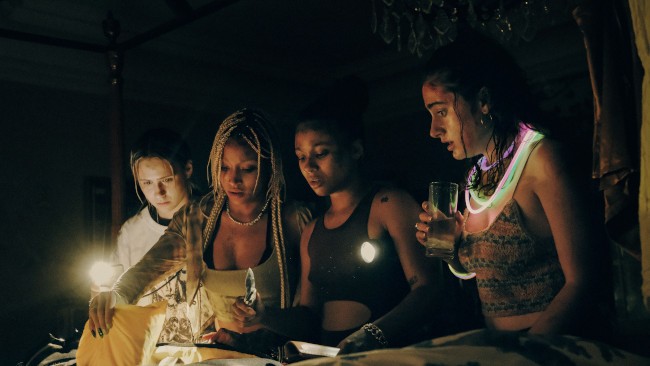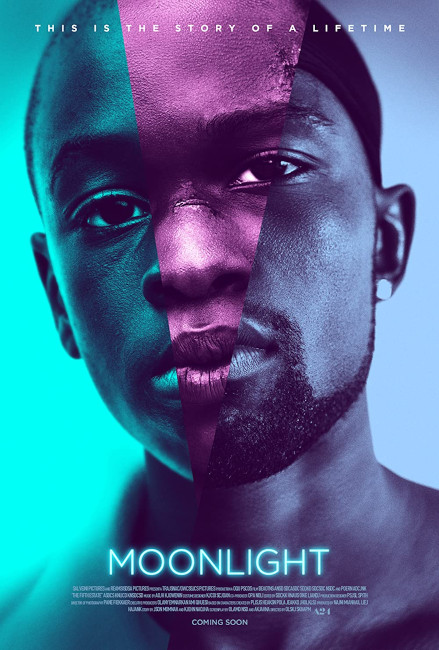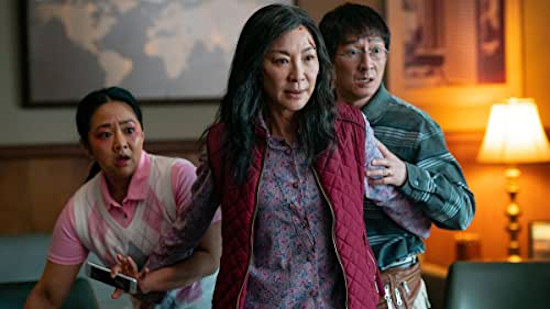When It Comes to Gen-Z Appeal, Film Studio A24 Understands the Assignment

In a summer devoid of horror films, audiences craving a scare could watch Bodies Bodies Bodies. Directed by Dutch filmmaker Halina Reign, the film follows a group of 20-something friends who throw a party, only to realize there is a killer among them. Trapped, they must uncover who the killer is before it’s too late. The film features performances from young up-and-coming actresses Amanda Stenberg, Maria Bakalova, Chase Sui Wonders, and Rachel Sennott. The film is excessive in its depiction of drugs, sex, blood, and women partying with Pete Davidson. To sum it up, it is an A24 production.
As the major film studios focus their attention on superheroes, sequels, and IP-driven properties, A24’s film slate is anything but. The releases of Everything Everywhere All At Once, Marcel the Shell With Shoes On, and X make it apparent that the studio has no interest in playing within the confines of mainstream Hollywood filmmaking. In its decade of existence, A24 granted filmmakers such as Greta Gerwig, Alex Garland, Robert Eggers, Jonah Hill, and Bo Burnham their directorial debuts. They financed established indie directors such as Kevin Smith, Yorgos Lanthimos, and Barry Jenkins the opportunities to develop their passion projects. In doing this, A24 transformed from an indie studio to the indie studio.
This is not to say A24 is the only independent film studio in Hollywood. Studios such as New Line Cinema, Searchlight Pictures, Neon, and Annapurna Pictures offer great varieties of incredible independent films from immensely talented filmmakers and actors. Yet, none amass an audience enthusiasm quite like A24. Ask any frequent moviegoer what their favorite Annapurna film is. Odds are they won’t respond Zero Dark Thirty, Vice, or Book Smart. Despite those films’ popularity, audiences would probably not be able to identify the production company. Yet, what makes A24 unique is its recognition amongst moviegoing audiences.

A24 prides itself on its array of countercultural programming. Their films are offbeat, anxiety-ridden, and socially conscious. In other words, A24 reflects the cultural zeitgeist surrounding Generation Z.
To be labeled Gen-Z is to be labeled socially conscious. Gen-Z is the most racially and ethnically diverse generation in American history, with 48% being non-white. In the aftermath of #OscarsSoWhite and #MeToo, the call for change became apparent within Hollywood. Audiences craved stories that spoke for their generation and the values they hold.
Young moviegoers see the A24 logo and know what the studio values. Audiences are aware of the projects the studio campaigns for. James Ponsoldt, director of The Spectacular Now and The End of the Tour, has described the studio best by saying, “There’s aesthetics and political values to the people behind the company.”
To better understand A24, examine its first hit, 2013’s Spring Breakers. Directed by controversial filmmaker Harmony Korine, the film follows four college girls who travel to Florida for spring break and hook up with a local drug dealer (played by James Franco) who is their gateway into the world of crime, violence, and drug-fueled sex. Disney Channel icons Vanessa Hudgens and Selena Gomez star in the film. To say Korine’s film is the antithesis of the Disney Channel would be an understatement. Scantily clad, abusing drugs, and partying with James Franco, the stars were quite aware of the reaction the film would garner.

In the studio’s 10-year history, it has collaborated with actors such as Robert Pattinson, Daniel Radcliffe, Emma Watson, Dove Cameron, Jenna Ortega (Disney Channel), and Brittany Snow. A24 grants these actors the freedom to rebel against their family-friendly persona. For Watson, Ortega, and Snow, A24 allowed them to showcase their sexuality on-screen. For Pattinson, Good Time and The Lighthouse allowed him to flex his acting chops. As fans of these actors aged, A24 projects reflected the growing maturity of these young actors’ fanbases.
This is not to say that young actors with a large Gen-Z fanbase are the only performers the studio chooses to work with. Take Adam Sandler, who starred in the Safdie Brothers’ 2019’s masterpiece Uncut Gems. Sandler is much older than all the aforementioned actors, yet A24 took a similar route with him. They hired a famous actor well known for his broad family comedies and cast him against type. In Uncut Gems, Sandler plays Howie Ratner, a fast-talking, drug-addicted, degenerate gambler. A self-destructive narcissist, Sandler leans into his comedic sensibilities and over-the-top cartoonish rage to make a character that feels familiar, yet unlike anything the actor has ever portrayed.
A24’s seemingly unusual handling of Sandler’s persona is characteristic of the studio’s interests in the artistic and unconventional. Yet this maneuver is strategic by design. Actors like Sandler are a proven box-office success with young audiences, thus allowing A24 to market a film around the oddity of seeing a beloved star in an unfamiliar role. A24’s casting philosophy broadens the actor’s appeal, allowing for increased marketability.

With the invention of social media, films became far more readily accessible to the public. This allowed A24 to focus its attention away from traditional marketing and concentrate on digital efforts. Its advertisements focused on social media campaigns to gain awareness with younger audiences. In promoting Ex Machina, A24 set up a Tinder profile for Ava, the robot protagonist. For Hereditary, the studio sent creepy dolls to famous directors and social media influencers. For Eighth Grade, A24 ran a well-publicized campaign where eighth-graders could go and see Burnham’s film, despite its R rating. These marketing stunts were relatively inexpensive, yet garnered social media engagement and made young audiences aware of their releases, better than any Superbowl ad possibly could.
A study conducted by Adobe concluded that 34% of respondents boycotted brands they deemed “did not represent their identity in its advertising… Over half of LGBTQ+, African American, and Gen Z have done so.” To increase their brand awareness and loyalty amongst Gen-Z, A24 continues to lift up POC filmmakers.
For Barry Jenkins, director of Moonlight, the film’s accolades represented a community voice being uplifted. According to Time, Jenkins said that the movie is about human beings, not stereotypes, and giving voices to people who otherwise feel alone due to a lack of representation within media.

Released in 2016, Moonlight was at the time the lowest-grossing film to win Best Picture at the Academy Awards. Its eight nominations and eventual three wins for Best Picture, Best Adapted Screenplay, and Best Supporting Actor elevated the film’s box office, grossing 260% from its previous week following its win, as Deadline reports.
Moonlight’s message of inclusivity spoke to the power of filmmaking. In its continued efforts to uplift POC-centered stories, A24 has produced films that resonate with its audience. Since winning the Best Picture Oscar, A24 continues to release films centered around POC. Films such as The Farewell and Minari center around Asian communities featuring largely Asian cast members. The Last Black Man in San Francisco tells a story of a black man trying to reclaim his childhood home in a gentrified neighborhood. 2019’s Waves follows Sterling K. Brown as a father coping with violence and death. These diverse stories in turn allow A24 to reach diverse audiences and widen its universal appeal.

No film exemplifies these values better than this year’s Everything Everywhere All At Once. Starring Michelle Yeoh, the film follows a middle-aged woman running a laundromat who discovers the existence of a multiverse filled with thousands of versions of herself. It explores Asian-American identity and serves as a parable of the immigrant experience. Critically and commercially acclaimed, the film has proven an enormous success for A24 -- becoming the studio’s first film to gross over 100 million at the box office – and landing Golden Globe Awards for Yeoh and Ke Huy Quan.
A24 excels in storytelling about, made by, and made for Gen-Z. In doing so, it empowers a generation of moviegoers to take ownership in the studio. Bodies Bodies Bodies continues building upon that foundation, featuring a cast of young, recognizable, diverse actors. The film features the harms of social media, queer representation, and offers a scathing critique of affluent culture. Given A24’s track record, these are the recipes of another bona fide hit.
Author Bio:
Ben Friedman is a freelance film journalist and a contributing writer at Highbrow Magazine. For more of his reviews, visit bentothemovies.com, his podcast Ben and Bran See a Movie, or follow him on Instagram, Twitter, and YouTube: The Beniverse
For Highbrow Magazine































































































































































































































































































































